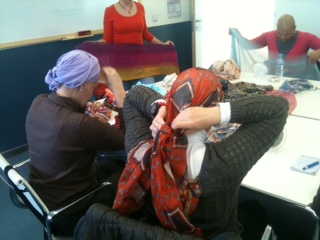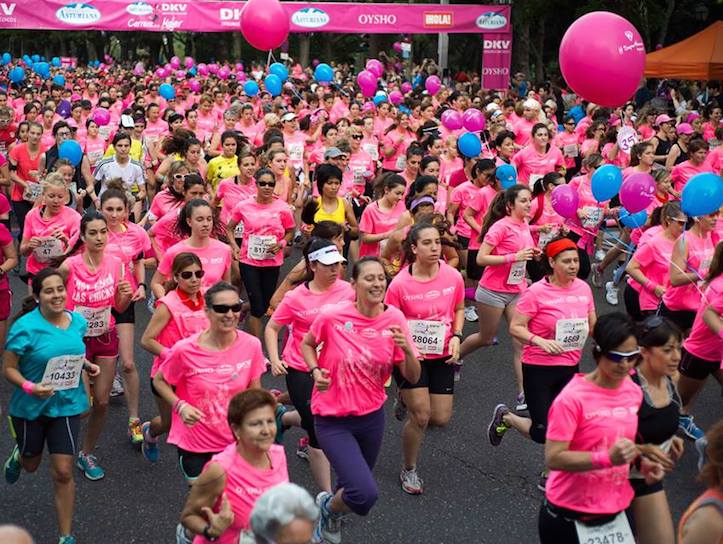We’re providing integral services that help women better cope with breast cancer.
Why we care: Breast cancer is the third most common type of cancer, and it is estimated that more than 21,000 new cases will be diagnosed in Spain in 2015.
How we’re solving this: By offering services that optimize quality of life for patients and minimize cancer’s emotional affects – both physical and social – for women with breast cancer.
We need your support to continue to care for women with breast cancer through our Mucho por vivir program. With your help, we’ll help women achieve psychological and physical well being, minimize the emotional toll of the disease and its treatment, and build social networks for women by hosting leisure activities.
 Mucho por vivir supports women who are diagnosed with breast cancer in Spain. Women can join our program at any phase of the disease – no matter what their social and economic situation is. Given that cancer is a disease that directly affects family members as well, our program provides patients and families with tools to face the condition and minimize cancer’s secondary effects.
We first launched this program in 1991 to tend to the needs of women with breast cancer. Our services include: psychosocial care, lymphedema rehabilitation, leisure activities, and being part of a sisterhood through our volunteers. The program is implemented throughout all of Spain, with the help of professional experts including: psychologists, social workers, sanitary personnel, and volunteer coordinators.
Women who have been part of our program are deeply satisfied with the services we provided, and many of them have become part of our volunteer system after they’ve recovered. In 2013, we estimated that we reached a total of 23,892 patients. With your support, we’ll reach more!
Our goal is to reach even more women, since the number of women in our programs is small compared to the total of breast cancer patients in Spain. We believe that our services must reach a wider range of women, so that they can beat the disease while receiving the much-needed support they deserve.
Mucho por vivir supports women who are diagnosed with breast cancer in Spain. Women can join our program at any phase of the disease – no matter what their social and economic situation is. Given that cancer is a disease that directly affects family members as well, our program provides patients and families with tools to face the condition and minimize cancer’s secondary effects.
We first launched this program in 1991 to tend to the needs of women with breast cancer. Our services include: psychosocial care, lymphedema rehabilitation, leisure activities, and being part of a sisterhood through our volunteers. The program is implemented throughout all of Spain, with the help of professional experts including: psychologists, social workers, sanitary personnel, and volunteer coordinators.
Women who have been part of our program are deeply satisfied with the services we provided, and many of them have become part of our volunteer system after they’ve recovered. In 2013, we estimated that we reached a total of 23,892 patients. With your support, we’ll reach more!
Our goal is to reach even more women, since the number of women in our programs is small compared to the total of breast cancer patients in Spain. We believe that our services must reach a wider range of women, so that they can beat the disease while receiving the much-needed support they deserve.

 Mucho por vivir supports women who are diagnosed with breast cancer in Spain. Women can join our program at any phase of the disease – no matter what their social and economic situation is. Given that cancer is a disease that directly affects family members as well, our program provides patients and families with tools to face the condition and minimize cancer’s secondary effects.
We first launched this program in 1991 to tend to the needs of women with breast cancer. Our services include: psychosocial care, lymphedema rehabilitation, leisure activities, and being part of a sisterhood through our volunteers. The program is implemented throughout all of Spain, with the help of professional experts including: psychologists, social workers, sanitary personnel, and volunteer coordinators.
Women who have been part of our program are deeply satisfied with the services we provided, and many of them have become part of our volunteer system after they’ve recovered. In 2013, we estimated that we reached a total of 23,892 patients. With your support, we’ll reach more!
Our goal is to reach even more women, since the number of women in our programs is small compared to the total of breast cancer patients in Spain. We believe that our services must reach a wider range of women, so that they can beat the disease while receiving the much-needed support they deserve.
Mucho por vivir supports women who are diagnosed with breast cancer in Spain. Women can join our program at any phase of the disease – no matter what their social and economic situation is. Given that cancer is a disease that directly affects family members as well, our program provides patients and families with tools to face the condition and minimize cancer’s secondary effects.
We first launched this program in 1991 to tend to the needs of women with breast cancer. Our services include: psychosocial care, lymphedema rehabilitation, leisure activities, and being part of a sisterhood through our volunteers. The program is implemented throughout all of Spain, with the help of professional experts including: psychologists, social workers, sanitary personnel, and volunteer coordinators.
Women who have been part of our program are deeply satisfied with the services we provided, and many of them have become part of our volunteer system after they’ve recovered. In 2013, we estimated that we reached a total of 23,892 patients. With your support, we’ll reach more!
Our goal is to reach even more women, since the number of women in our programs is small compared to the total of breast cancer patients in Spain. We believe that our services must reach a wider range of women, so that they can beat the disease while receiving the much-needed support they deserve.



